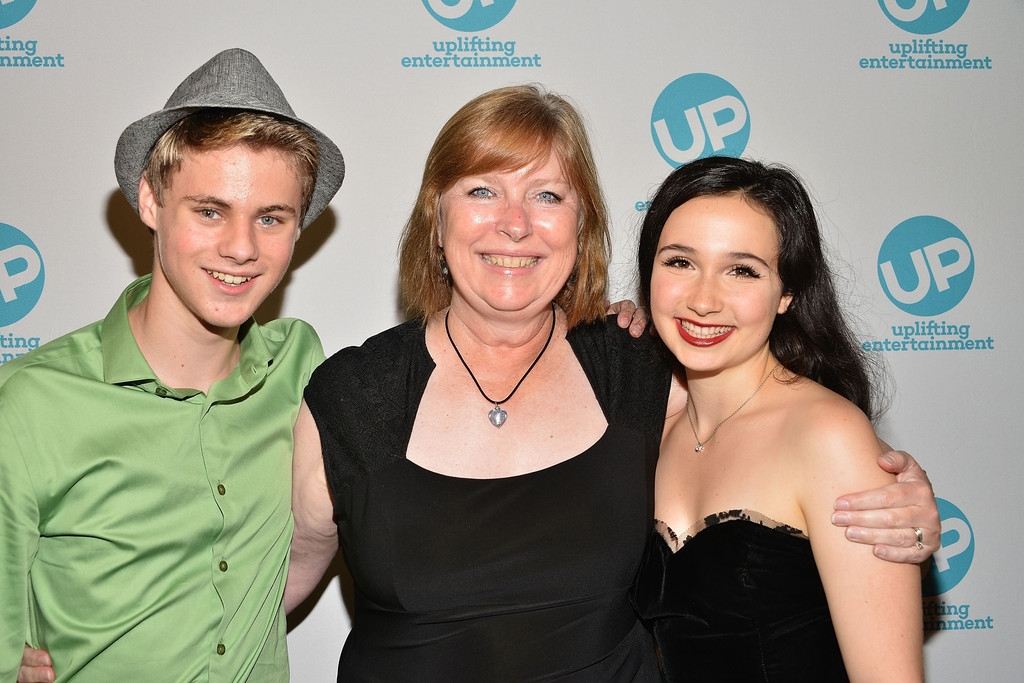Sheryl J. Anderson has worked as a writer-producer for television (including Charmed, Flash Gordon, and When Calls the Heart). She has sold pilots to Disney Channel, SyFy, and Lifetime and written several television movies, and was a creative consultant for Canada’s What’s Up, Warthogs! Her essay “What Would Jesus Write?” appears in the book Behind the Screen: Hollywood Insiders on Faith, Film, and Culture.
In it she says:
If we want Christ to be seen everywhere, we have to be willing to see him everywhere. We have to be willing to write and to watch stories of redemption, charity, and love, and celebrate the Spirit inherent in them…
I want to write so that the Good News is so entwined in the muscle of what I am writing that it can’t be stripped away, can’t be disregarded… I want to write the way I live—completely integrated, so the Christian flows into the mother, is bound to the wife, is enmeshed with the friend. So you can’t tell where the faith begins and stops because it doesn’t. Because it is continuous and eternal, just like the love that inspires it.
Sheryl Anderson is one of the ‘exemplars’ of faith-work integration in a new study by Barna Group called Christians at Work in the US context. The first report in a multi-year initiative came out in the last 12 months. It is based on in-depth interviews with 33 ‘exemplars’ — practitioners and thought-leaders — which helped frame the quantitative survey of 1,459 self-identified US Christians; and was followed up with 424 US Protestant senior pastors.
One of the key areas of the study is looking at how people integrate their faith and work.
Barna scored and group individuals according to their response to the following four statements:
1. “I can clearly see how the work that I am doing is serving God or a higher purpose.”
2. “I find purpose and meaning in the work I do.”
3. “I am looking to make a difference in the world.”
4. “As a Christian, I believe it is important to help mould the culture of my workplace.”
Christians who agree strongly with these attitudes are referred to by Barna as Integrators of faith and work. In the middle are Onlookers, with whom these ideas moderately resonate. At the opposite end of the spectrum are Compartmentalisers, who express a low level of agreement with these mindsets.
The study participants divided up according to the following breakdown:
Integrators: 28%
Onlookers: 38%
Compartmentalisers: 34%
Integrators tend to score strongly for the following statements:
I feel “made for” or called to my current work
My work utilises my unique strengths, talents and capabilities (% strongly agree)
I am very satisfied with how my work is preparing me for my future plans
I am very satisfied with how well my work fits my calling
I am very satisfied with future opportunities in my work
My work aligns well with my educational background (% strongly agree)
I am very satisfied overall with my current job
I find ways to use my unique strengths, talents and capabilities outside the workplace (% “very true”)
This suggests that Integrators are more satisfied in their work context; but importantly they are also thriving relationally, spiritually, and in a church context.
What does it look like? Barna’s interviews with the ‘exemplars’ give a clue as to what this might look like in our daily work:
“You can be called to be a plumber or a fisherman or a venture capitalist, as long as you live your values and faith through what you do—that’s what matters. We need more Christians
to approach their work this way and not decouple their faith from their vocation.”
—Phil Graves, senior director of corporate development for Patagonia
“It is my duty as a Christian artist raising the next generation of Christian artists to protect them from bad art, just as much as it is to protect them from bad theology. I want to make sure that I’m telling compelling stories as well as convicting stories, that I’m creating embraceable, recognisable characters who are going to make people think and they’re going to make people feel. And if I’m lucky, they’re going to shake people up a little bit.”
—Sheryl J. Anderson, television writer
I think that the way to be the best example of living out your faith in the marketplace is to do incredible quality work and create products and services that are like the top one percent. And then that gives you the right to talk, and people will listen to you. And then that leads to questions.”
—Woody Faulk, vice president of innovation & new ventures for Chick-fil-A
“To listen to people, to be an ear, and to create community—I think that’s the purpose. Hopefully, through the chair and through loving and understanding and listening to people, they would, to put it in Christian terms, ‘see Christ through me.’ And they would see that and want to experience it for their own lives .”
—David Martinez, barber shop owner
“[My work] is the Kingdom; it’s new creation. I am new creation. God is pruning and refining me to inspire, but whatever is left, my identity in Christ, is the new creation. My job is to bring that out in my art.”
—Makoto Fujimura, artist, writer
